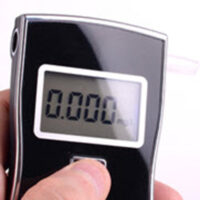Can A Judge Throw Out A Breathalyzer Test That Indicates I Was Not Drunk?

It is fairly common knowledge that a person commits DUI in Florida if they have a blood-alcohol content of 0.08 percent or higher as measured by a Breathalyzer or similar chemical test. Prosecutors will often introduce unfavorable test results to secure a defendant’s conviction. Keep in mind, however, that strictly speaking, a test is not necessary to prove DUI beyond a reasonable doubt. The state may rely on other evidence of drunk driving, such as eyewitness testimony, in making its case.
Second District: Rules for Admitting Test Results Different in Criminal, Administrative DUI Proceedings
Still, it is easy for a jury to conclude that a defendant who fails a Breathalyzer test committed a DUI. Similarly, if a jury is presented with a test where the defendant’s DUI was less than 0.08 percent, that would make a strong case for “reasonable doubt” justifying an acquittal.
So it should probably come as no surprise that prosecutors will sometimes try and convince a judge to exclude a Breathalyzer test result that does not help their case. This occurred in a recent Florida DUI case, Williams v. State. The state managed to convince the trial judge to stop the defense from telling the jury about a Breathalyzer test. But the Florida Second District Court of Appeals called shenanigans and threw out the defendant’s ultimate DUI conviction.
Here is what took place. A police officer arrested the defendant on suspicion of DWI. Another officer then administered a Breathalyzer test back at the police station. Normally, the defendant is asked to give three breath samples. In this case, only one of the three samples manage to produce a reading–which was just 0.04 percent, or half the legal limit in Florida.
When the defense brought this up during opening statements, the prosecution objected. The state’s position was that a Breathalyzer test was not valid unless it analyzed at least “two valid samples.” The judge sustained the objection and instructed the jury to disregard the defense’s reference to the single test.
The trial continued. The judge later barred the defense from cross-examining a prosecution witness about the single 0.04 test result. During jury deliberations, the jury then asked the judge about the test. The judge replied “there was no valid sample given in this case, so you are not going to consider at all a breath alcohol content.” The jury subsequently found the defendant guilty.
As the Second District explained, the error made by both the prosecution and the trial judge was relying on a prior decision from the Florida Fifth District Court of Appeal, which involved a scenario where a person challenged the administrative suspension of their driver’s license for DUI. The rules governing those proceedings required at least two samples to obtain a valid Breathalyzer result. But the Second District said this standard did not apply in criminal DUI cases. Indeed, there was no rule prohibiting the introduction of a single test result in a criminal case. The jury might choose to give less weight to a single result but the defense was still entitled to the admission of the evidence.
Contact Florida Criminal Defense Attorney Jose Baez Today
There are often a number of grounds to defend yourself against a DUI charge. A qualified Orlando DUI lawyer can review your case and help explain your options to you. Contact the Baez Law Firm today to schedule a free consultation with a member of our team.
Source:
2dca.org/content/download/804647/opinion/210059_DC13_11172021_090754_i.pdf




















